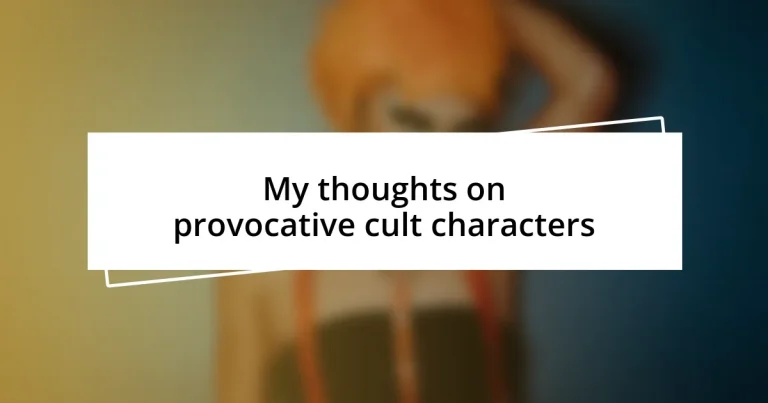Key takeaways:
- Cult characters resonate with audiences due to their moral ambiguity and complex traits, challenging notions of right and wrong.
- Provocative archetypes, such as rebels and anti-heroes, provoke critical thought about societal norms and personal values.
- Historical cult figures, like Jim Jones and David Koresh, illustrate the dangers of charismatic leadership and manipulation of belief systems.
- The media significantly shapes perceptions of cult characters, often glamorizing them while neglecting the consequences of their actions.
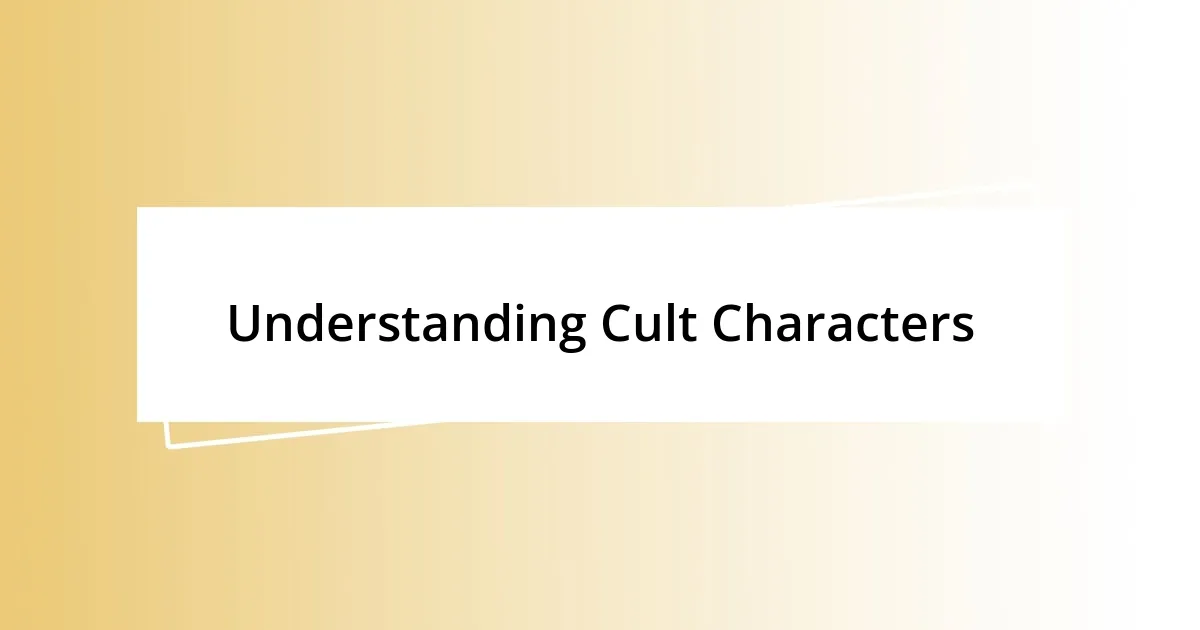
Understanding Cult Characters
Cult characters are fascinating because they often embody the extremes of human experience. I remember watching a movie where a character faced severe alienation, and it resonated deeply with my own feelings of being misunderstood at times. Isn’t it intriguing how these characters reflect our fears and desires, creating an emotional bridge between fiction and reality?
What truly sets cult characters apart is their complexity and moral ambiguity. I think about the anti-heroes who captivate us—like the ones who make questionable choices but still tug at our hearts. They challenge our understanding of right and wrong, inviting us to ponder: what would I do in their shoes? This inner conflict makes them relatable and intriguing.
Moreover, the loyalty these characters inspire speaks volumes about human nature. I’ve witnessed friends passionately debate the merits of a cult character, as if their fate were tied to their own. It’s this shared connection that solidifies the cult status, transforming these characters into icons that live on in our memories and conversations long after the story ends.

Defining Provocative Archetypes
Defining provocative archetypes involves examining how these characters reflect societal norms and challenges. I often find myself drawn to characters that disrupt the status quo, like the rebellious figures in literature and film who question authority. It’s as if they hold a mirror to our own lives, making us contemplate the societal boundaries we navigate daily.
At their core, provocative archetypes have unique traits that resonate with our deep-seated feelings and struggles. For instance, the “trickster” archetype, often playing mischievous roles, can provoke laughter and thought simultaneously. I recall a time when a trickster character in a show made me reconsider what honesty really means in a world full of deceit. It’s precisely this duality that compels us to engage with challenging ideas.
Interestingly, these archetypes evoke passionate responses from audiences. I vividly remember engaging with friends about a morally ambiguous character who pushed the limits of their environment. Our discussions revealed not just our personal values but also our discomfort with how easily we could admire someone’s flaws. This tension between admiration and critique underscores the powerful role that provocative characters play in shaping our perspectives.
| Archetype | Description |
|---|---|
| Rebel | Challenges societal norms and expectations |
| Trickster | Uses wit and cunning to subvert authority |
| Anti-hero | Displays morally complex traits that resonate with audiences |
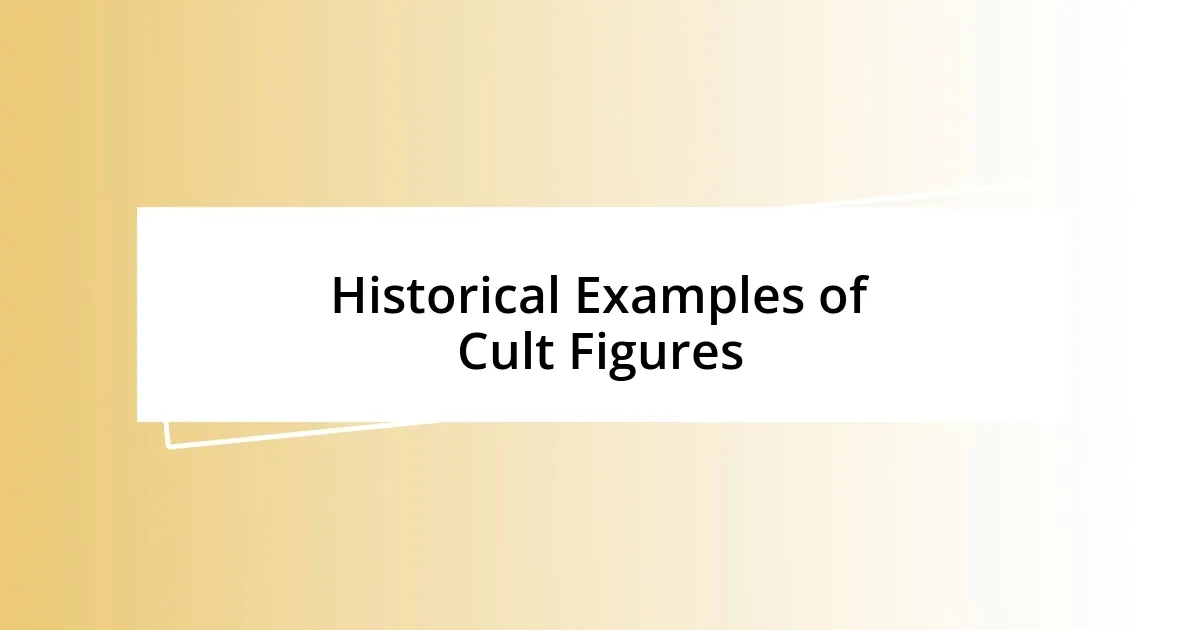
Historical Examples of Cult Figures
Throughout history, certain figures have emerged as cult personalities, often garnering intense followings due to their radical ideas or charismatic presence. For instance, think of Jim Jones. His ability to manipulate and inspire people led to a tragic culmination at Jonestown. Reflecting on how he held sway over his followers, I remember feeling a chilling sense of disbelief when I first learned about the events—they serve as a stark reminder of the potential power one individual can wield over a collective mindset.
- Jim Jones (1931-1978): Leader of the Peoples Temple who orchestrated a mass murder-suicide in Guyana.
- David Koresh (1959-1993): Head of the Branch Davidians, known for his standoff with the FBI in Waco, Texas.
- Charles Manson (1934-2017): Cult leader tied to a series of infamous murders in the late 1960s, emphasizing apocalyptic beliefs.
Another compelling example is David Koresh. He convinced his followers that he was a prophet, capable of interpreting biblical prophecies. I can’t help but be struck by the complexities of faith and manipulation in his story. It stirs an emotional response in me to think about how individuals can lose their agency, entrusting their lives to someone else’s ideology. This dynamic showcases the vulnerability that resides within human connections and belief systems.
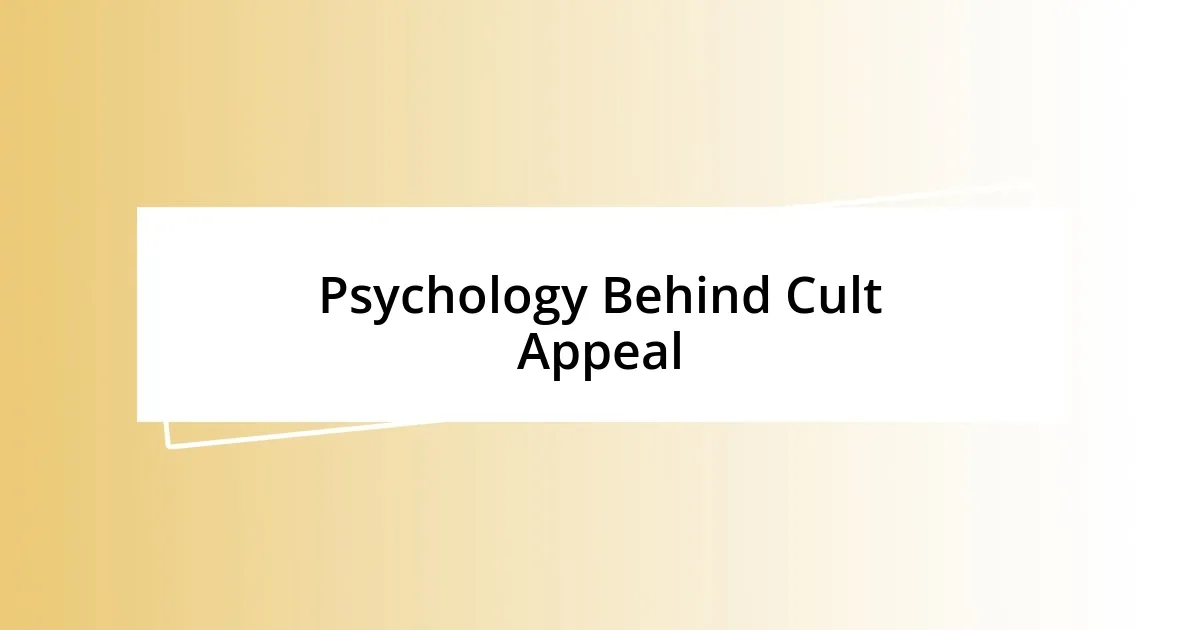
Psychology Behind Cult Appeal
Understanding the psychology behind cult appeal is fascinating and, at times, alarming. People often turn to cults during periods of uncertainty. Personally, I’ve seen how individuals facing personal crises or societal changes can become more susceptible to charismatic leaders who promise belonging and answers. It raises an interesting question: why do we sometimes surrender our critical thinking in exchange for acceptance and meaning?
One of the compelling aspects of cults is their ability to create a powerful sense of community. I can recall a documentary I watched where followers described their deep emotional connections with each other, often feeling safer within the group than outside it. This emotional bond can be intoxicating, drawing people in and making it challenging to see the red flags. It’s as if they form a bubble, completely isolated from the contrasting viewpoints the outside world might offer. Isn’t it curious how quickly a supportive environment can morph into a reliance on the group’s ideology?
Moreover, the allure of a clear, simplistic worldview is incredibly appealing, especially in complex times. I remember discussing this with a friend who spoke about her family’s experiences in a well-known cult from the ’70s. She explained how the certainty and structure provided by the group seemed like a comforting blanket against the chaos of the world. This resonates with my own observations—the desire for clarity is a powerful motivator that can cloud judgment and lead to actions that, in hindsight, seem inconceivable. How do we balance the yearning for community with the need for individuality and critical thought?
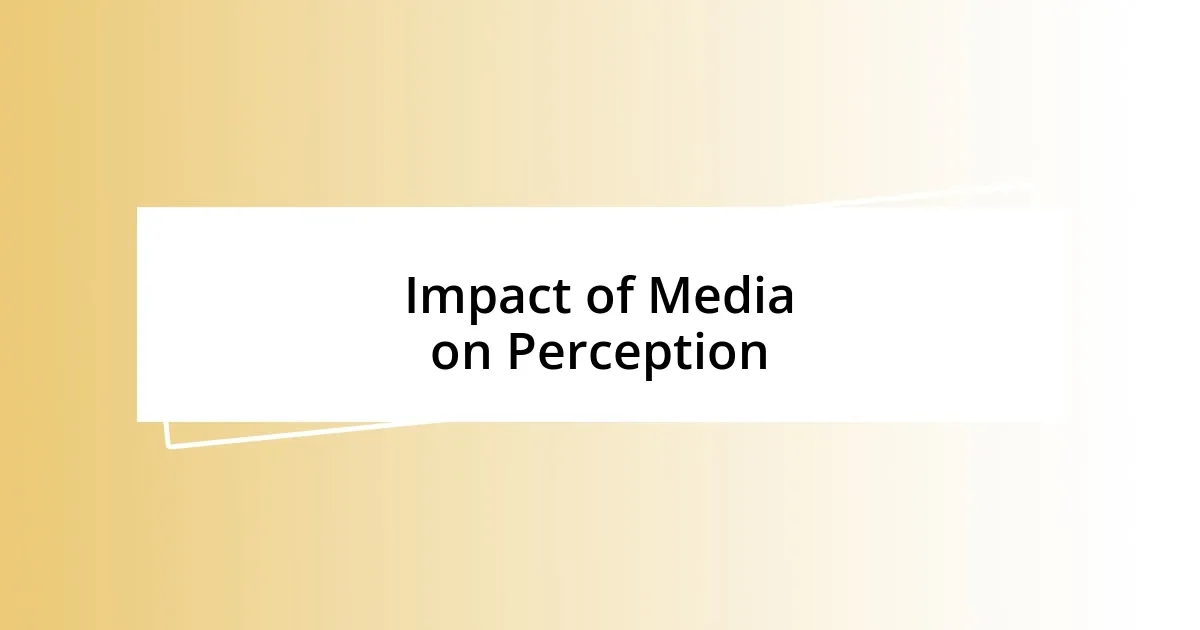
Impact of Media on Perception
When I think about how media shapes our perception of cult characters, I can’t help but reflect on my own experiences while watching docuseries or films about these figures. I remember binge-watching a series that focused on Charles Manson. It was fascinating, yet unsettling, to see how the portrayal of Manson both glamorized and vilified him simultaneously. It made me question: are we unwittingly contributing to the mythos of these characters every time we consume such content?
Moreover, social media today amplifies the influence of these cult figures in ways we couldn’t have imagined before. I often find myself scrolling through platforms filled with threads that dissect their ideologies and actions, leading to a kind of glorification. A few months ago, I joined a discussion online about a more contemporary cult leader. Some participants seemed enthralled by his charisma, as though they forgot the very real dangers attached to such figures. Does this fascination blind us to the consequences of uncritical engagement with sensationalized narratives?
Ultimately, the impact of media on our understanding of these characters is profound. I recall reading a memoir by a former cult member who vividly described how media representations not only shaped public opinion but also affected her healing journey. She spoke about grappling with the duality of the character, thus highlighting the struggle to reconcile her lived experiences with the narratives presented in various media outlets. It’s a poignant reminder that the stories we see and hear can deeply influence our perceptions and, at times, challenge the very fabric of our understanding.

Analyzing Provocative Character Traits
Analyzing the character traits of cult figures can be quite revealing and unsettling. One trait that consistently stands out is their charisma; these individuals possess an innate ability to draw people in and make them feel understood. I once attended a lecture where a psychologist detailed how even the subtlest gestures and eye contact can create a bond of trust. Isn’t it fascinating how someone can wield such power over emotional connections, making followers feel as if they’ve found their purpose?
Another provocative trait is the manipulation of fear and paranoia. I remember reading about a cult leader who thrived on creating an “us versus them” mentality, which made his followers feel constantly under siege from the outside world. It struck me how this tactic not only fortified the group’s loyalty but also dismantled individual critical thinking. When you fear the outside, doesn’t it become all too easy to overlook the strange actions happening right in front of you?
Finally, the aggressive certainty with which these characters preach their beliefs often leaves no room for doubt. I’ve encountered discussions about this absolute conviction, with a friend mentioning how her uncle seemed compelled by such leaders due to their unwavering stance on their ideologies. It’s almost intoxicating—when someone presents their views as the only truth, how can we resist the allure of certainty in an uncertain world? This blend of charm, fear, and fervor creates a potent mix, truly making provocative cult characters a subject worthy of deep exploration.
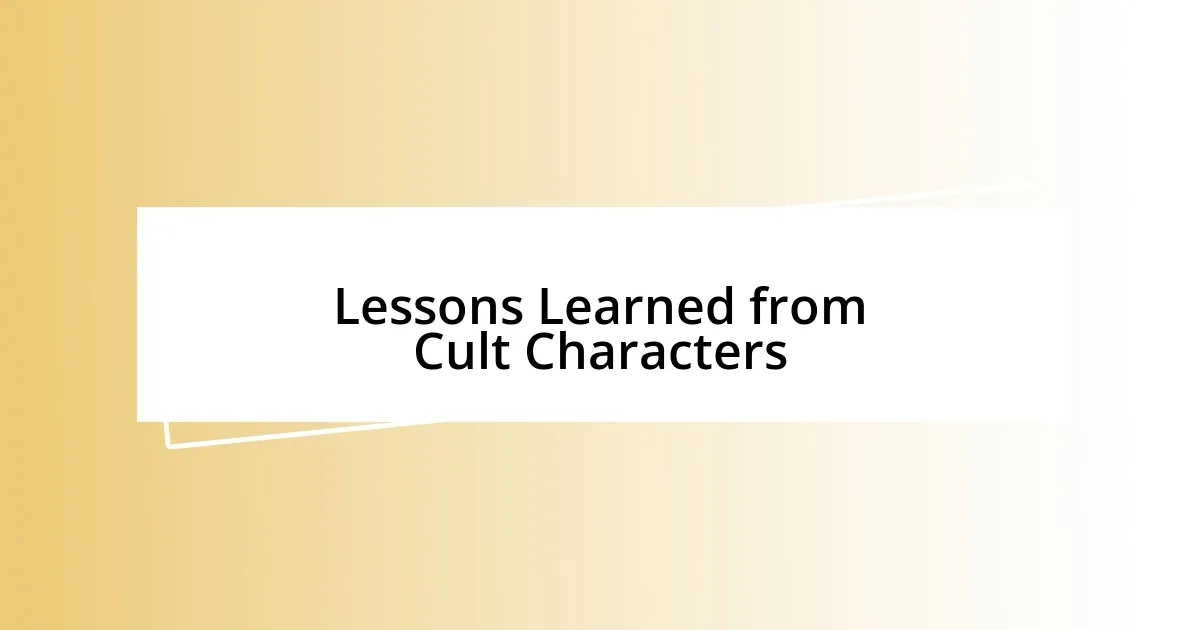
Lessons Learned from Cult Characters
Reflecting on the lessons learned from cult characters, I find that they often serve as a mirror to our vulnerabilities. I recall joining a group discussion where someone admitted how a charismatic leader had exploited their need for belonging. It made me realize that in our search for community, we might overlook red flags, highlighting the importance of self-awareness and critical thinking to navigate our emotional landscapes.
Additionally, these characters teach us the significance of questioning authority. During a college ethics class, we dissected the influence of cult leaders and their rigid doctrines. It struck me how essential it is to challenge ideas that demand blind loyalty. Engaging in this kind of reflective questioning can build a stronger sense of personal integrity and empower us to make informed decisions.
I also learned that it’s crucial to differentiate between fascination and endorsement. I remember catching myself scrolling through a documentary on a notorious cult leader, intrigued yet unsettled. That moment prompted me to ask: How do we appreciate the complexity of human behavior without glamorizing harmful actions? This balance between curiosity and discernment is vital in understanding the stories of these figures, ensuring we learn rather than idolize.






